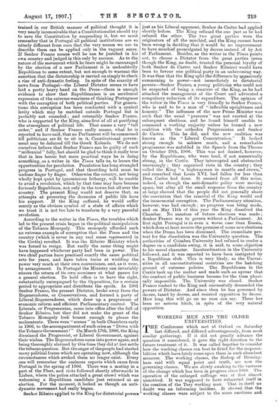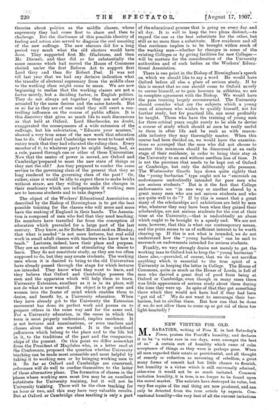WORKING MEN AND THE OLDER UNIVERSITIES.
THE Conference which met at Oxford on Saturday last differed, and differed advantageously, from most similar gatherings. If it did not greatly advance the question it considered, it gave the right direction to the future treatment of it. It was called together to consider how the working classes can best be fitted for the responsi- bilities which have lately come upon them in such abundant measure. The working classes, the Bishop of Birming- ham said with equal point and truth, are now the governing classes. We are slowly awaking. to the vastness of the change which has been in progress since 1868. The operation of the enlarged suffrage was at first almost unnoticed. It was supposed to have exhausted itself in the creation of the Tory working man. That in itself no doubt was an informing incident. It showed that the working classes were subject to the same emotions and theories about politics as . the middle classes, whose supremacy they . had come first to share and. then to challenge. But the disclosure of- this possibleldentity.of feeling and action also served to disguise the real meaning of the- new suffrage. The new electors did for a long period. very much what the old electors would have done. They supported first Mr. Gladstone, and then Mr. Disraeli, and they did so for substantially the same reasons which had moved the House of Commons elected. , the first Reform Act to . support first Lord. rey and then Sir Robert Peel. It was not till; last 'year that we had any decisive indication what the. transfer of electoral supreniacy from the middle class to the .working class might come to mean. We are now beginning to realise that the working daises are not a factor-merely, but a deciding factor, in English politics. They do, not always act together ; they are not always actuated by the same desires and the same hatreds. But in' so" fir as they are of one mind they will exert a con- trolling influence on the course of public affairs.' It is thiS,disCofery that gives so much life to such discussions as that held at Oxford. Lord Sherbrooke, no doubt, exaggerated the consequences of a wide extension of the Suffrage, but his exhortation, " Educate your masters," showed a very true sense of the new work that education has to' do. Oxford and Cambridge were wont to boast with entire truth that they had educated the ruling class. Every member of it, to whatever party he might belong, had, as a rule,:ptissed through one or other of these Universities. Nov_ that the centre of power is moved, are Oxford and Cartibridge`prepared to meet the new state of things as they. Met the old ? Are they prepared to render the same service to the governing. class of the present that they so lonci,rendered, to the governing class of the past ? Or, ratfier, since it would be idle to expect them to make bricks without straw, are, they willing to make the changes in their machinery which are indispensable it working men are to become students and to take degrees?
The object of the Workers' Educational Association as described by the Bishop of Birmingham is to: get the best .possible training for the classes who will more and more havethe making of England in their.hands. The Associa- tion is composed of men who feel that they need, teaching. Its members have' travelled far from the conception of education which prevailed for a large part of the last century.. They know, as Sir Robert Morant said on Monday, that what is needed " is not mere lectures, but real solid 'work in small. adult classes with teachers who know how to teach." Lectures, indeed; have their place and purpose. They are an excellent means • of stimulating the desire to learn. They-do not constitute study, as they are too often supposed to do, but they may create students. The working -then whom it is desired to bring to the old Universities have already passed through the stage for which lectures are intended. They know what they want to learn, and they- believe that Oxford and Cambridge possess the men and the apparatus which will help them to learn. University Extension, excellent as it is in its place, will not do what is now wanted. Its object into get men and women into the frame of- mind which enables them to desire, and benefit by, a University education. When they have already got to the University the Extension movement has done its perfect work and passes on to -prepare others in the same way and for the same end. For a University education, in the sense in which the term is most properly understood, implies residence. It is not lectures and examinations, or even teachers and Classes alone that are wanted. It is the undefined nfitiences which belong to the place and to the life led in it,i to the traditions of the past and the coMpanion- ehips of the present. On this point we differ somewhat from the President of Magdalen who, in a letter read at 'Ate Conference,'proposed the question whether University teaching can be made most accessible and most helpful by Makin , it to'working men or by bringing working men to far' as Oxford and Cambridge are concerned, reformers will do well to confine themselves to the latter of theie,alteknative plans; The formation of classes in the 2plae. es where working men most live may be an excellent subititute • for University training, but it will not be ITni'versity training, There will be the class teaching for an -hour-or two, and this may have very valuable results. But at•Oxford or Cambridge class teaching is only -a part of the educational process that is going on every day, and all day. It is well to keep the two plans distinct,—to. retard the one as the best substitute for the other,. but still as no more than a substitute. How residence and all that residence implies is to be brought within reach of the working man—whether by changes in some pf the existing Colleges or by giving facilities for new Colleges— will be matters for the consideration of the University, authorities and of such bodies as the Workers' Educa- tional Association.
There is one point in the Bishop of Birmingham's speech on, which we should like to say a word He would have Oxford before all else a place of serious stpdy., If by this is meant that no one should come to Oxford m2rely to amuse himself, or to gain honours in athletics, we are in complete agreement with the Bishop. We would have the pass .training largely reconstructed. The University should consider. what are the subjects which a young man of nineteen who wishes to qualify himself, not for further study, but for practical life, can most profitably be taught. Those who have the training of young men for three critical years ought surely to be able to devise a course of study which should at once be really useful to them in after life and be such as with reason- able industry they may thoroughly master. When this course had been decided on, we would have the examina- tions so arranged that - the men who' did not choose to master this minimum should be discovered at an early stage of their residence, in order to bring their stay at, the University to an end without needless loss of time. It is not the passman that needs . to be kept out of Oxford or Cambridge, but only the deliberately idle passman. The Westminster Gazette lays down quite rightly that the "young barbarian " type, ought not to " encroach on, endowments undoubtedly intended for poor men who are serious students." But is it the fact that College endowments are " in one way or another. shared by a great many men who are not serious students and who are quite well to do "? If by this is meant that a great many of the schOlarships and exhibitions are held by men who, whatever they may haVe been when they gained their scholarships, are not serious students for the rest of their time at the University,—that is undoubtedly an abuse which ought to be brought to a speedy end. We are not sure, however, that this is what our contemporary means, and the point seems to us of sufficient interest to be worth clearing up. If this is not what is intended, we do not understand how the " young barbarian " can be said to encroach on endowments intended for serious students.
Frankly, we very strongly desire not merely to get the working man to Oxford but to keep the "young bzirbarian " there also,—provided, of course, that we do not sacrifice anything which_ is essential to the true spirit of a University in keeping the latter in College. The House of Commons, quite as much as the House of Lords, is full of men who derived a great deal of good from being at Oxford or Cambridge, even though in many cases there was little appearance of serious study about them during the.time they were up. In spite of thatthey got something there which they would not have had. if they had been " got rid of." We .do not want ,to- encourage their bar- barism, but to civilise them. But how can that, be done if, we do not allow them to come up or get rid of them too light-heartedly ?



































 Previous page
Previous page